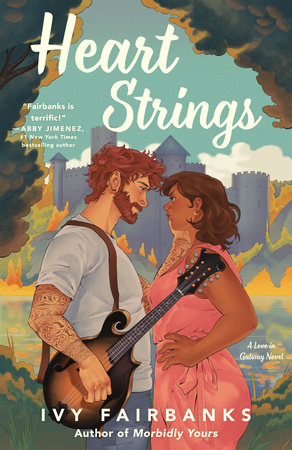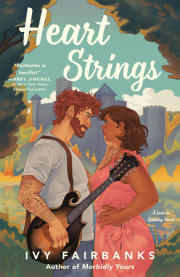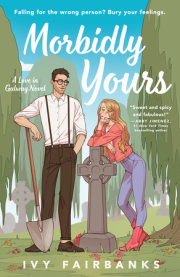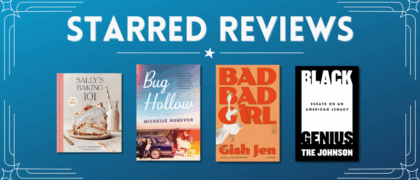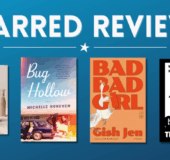Chapter 1
Aidan
September
"You're listening to Today's Top Forty live from London. This morning, we are joined in the studio by breakout Irish singer-songwriter Aidan O'Toole. You might know him from the summer smash 'Come Here to Me,' which hit number three on the Irish charts and number twenty on UK Billboard. Welcome to the show, Aidan."
Adjusting my headphones, I lean close to the mic. "Thanks for having me. I've been a longtime fan."
"Please tell our listeners a bit about yourself. You were raised in County Cork, adopted by Galway."
"Yes! I'm sure they're happy to claim you," her co-host interjects with a hand on my arm. Her cheeks pinken when I flash a smile.
"I live here in London now. Galway is where my family is, though, and I'm heading back there for a month. Leaving London tomorrow, actually."
"We hate to see you go . . ."
Don't worry, I think, it won't be permanent.
"Let's talk about Heaven-Bound," the main host says. "It's been nominated for the RTÉ Choice Music Prize."
"And well-deserved! It's so heartfelt."
"Thank you. It still hasn't sunk in, really, but it's such an honor."
I adjust the collar of the designer button-down the label's stylist asked me to wear today. Being dressed by someone else makes me feel like a paper doll.
"On the album, there's an arc of hope, of ecstasy, of loss," the host opines. "Honestly, I can't listen to that last song without getting a little lump in my throat."
"Tell me about it!" the other host jumps in. "The first time I listened, I ruined the eye makeup I was trying to apply because I couldn't stop crying but I didn't want to turn it off. Which gave me flashbacks of my Sufjan Stevens phase."
They share a quick chuckle.
"You're too kind," I say. "To even be mentioned in the same breath as an artist like Sufjan . . ."
"Really, it captured heartbreak so vividly," the first one adds. "And now the whole music world wants to know, who is this Irishman and who did he write these songs about?"
"Yes, are they all about the same muse? The songs seem too personal to simply be about character archetypes. You write about the different facets of love so well."
"I fall in love all the time," I lie. "I've fallen in love hundreds of times. Lyrics come easier when I have the right inspiration."
In the past, I'd fall fast, although admittedly, never deep. Not until Cielo. She made me realize those passing fascinations and lust hadn't been love at all. Two years after our separation, I still catch myself looking for glimmers of her in strangers. Sometimes I even realize I've been subconsciously scanning the front row, seeking her smoky hazel eyes so I can sing directly to her.
I haven't been truly in love with anyone before or since Lo.
"Your lyrics have been described as 'poignantly provocative.' How does it feel to hear that about your songwriting?" The interviewer keeps a straight face, but she's slowly crossing her legs while she stares at me.
"It's certainly flattering." Regardless of how the journalists and DJs goad me, I've no literary degree, and no interest in academically dissecting the sexual themes of my own songs during an interview. The music speaks for itself.
"Well, I'm sure your latest muse is very lucky."
I fidget with the spiral cord of the headphones. We're broadcasting live across the UK right now, and they want to bring up my ex-girlfriend, approaching the taboo subject deliberately because that's what listeners theorize about.
"I appreciate that, but I'm afraid a lad's got to keep some things to himself," I answer with a wink.
According to my manager, Martin, keeping tight-lipped will add to my "mystique." The label wants me to cultivate a slightly edgy image. More important, without details on my past relationship, fans can imagine themselves in my songs. A woman all but worshipped by a man, but the two destined to permanently part ways before the last reprise. In some songs, he is a warrior fighting for her. A fool. A lover. In my latest single, he is a marionette, strings pulled in every direction until he is drawn and quartered. But in every song, she is a goddess. Every woman, Martin argues, wants to be loved like that. Loved so hard that her memory alone will drive a man to rip himself apart.
And that's what I've done for the past year while touring for Heaven-Bound. Night after night, city after city: I tear myself open for an audience and enjoy a collective catharsis as we share in that emotion four minutes at a time. And I wonder if Cielo is listening.
“Christ! You’re pure style,” I say when Fionn answers the front door of our parents’ house wearing a Fair Isle jumper in red and white, Cork’s colors, with Gaelic footballs knit across his chest. He refuses to adopt the Galway jersey.
"Why are you knocking? It's weird and you'll offend Mam."
Although I bought this house, I've never lived here. Entering without knocking wouldn't feel right. Everyone else insists it's weirder that I don't simply let myself in through the back door.
"What is that abomination you're wearing?" I ask.
"Mam has gotten into patterns lately."
Garish but well-made knitwear is nothing compared to our seventeen-year-old sister's hobby of ventriloquism. Nine months ago, when I'd last visited, Marie brought out two horrific dummies while my da silently begged me not to say anything negative. Their wooden grins made my skin crawl. So of course, Fionn and Marie teamed up to place them in unexpected spots during my visit. I nearly soiled myself stumbling to the bathroom on Christmas morning half-asleep, only to come face-to-face with the soulless eyes of one perched on the toilet. Marie, with her angelic smile that has Mam and Da fooled, was the mastermind behind that prank.
My family's new place is two stories tall and a short walk from a waterfront park. A far cry from the peeling paint and leaking roof of the cottage I was raised in back in Cork, and an even larger departure from the dodgy council flat my family had squeezed into when they first moved to Galway to be closer to Marie's specialist. After signing with the record label two years ago, one of my first orders of personal business was moving my parents out of that moldering flat. Even after selling our old house and with Da working two jobs, they could barely afford to rent in Galway, with Mam staying home to care for Marie. I'd put my musical ambitions on the back burner then, in favor of a more stable job as a solicitor so I could help out. It feels good to provide for my family.
Mam wordlessly wraps her arms tight around me and gives me a good shake.
Still in his work clothes from the warehouse where he drives a forklift, Da rises from the battered old recliner he's had since I was a boy and claps me on the back. "Good to have you home."
"Aye. Missed you, Da."
Marie bolts down the stairs, prompting Ma to shout, "No running!"
She tackles me with surprising strength for a teenage girl.
"Well, then. Nice to see you, too." I muss her pixie cut and take a step back to observe the subtle changes since I was here for Christmas. She'd started the new year by chopping seven inches of hair, pleased that it was finally long enough to donate to a wig-making charity. "The jumper's lovely, too."
Bright purple knitwear adorned with clowns and elephants swallows up her torso. Marie lost interest in elephants back in third grade and has never shown an affinity for the circus. "Oh, just you wait."
"I've got a surprise for you!" Mam says. "Fionn, will you be a dear and go fetch your brother's gift from my room?"
The sparkle in Marie's eyes makes me uneasy as Fionn ascends the stairs and returns with a box. Mam eagerly gestures for me to open it. Music notes, harps, and guitars undulate in alternating stripes across the handmade jumper. It's the most hideous garment I've ever seen-except for Marie's.
"I made one for everyone," Mam says proudly.
"What about Da?" Fionn asks. "He didn't get a jumper."
"Ach! You're absolutely right. James, I'll get started on one for you straightaway."
Da shakes his head at Fionn. Marie bites the inside of her cheek, trying not to laugh.
"Look at this! It's lovely." I lift my jumper out of the box. If I make eye contact with Fionn, he's going to lose it and hurt Mam's feelings. She obviously spent loads of time on each one.
"I thought you could wear it onstage. You won't find quality like this on those high streets in London." She tugs at the Thom Browne cardigan the label's stylist sent to my flat a week ago. Other than surprise at its price tag, I don't have any strong feelings about it. "They couldn't even be bothered to put stripes on both arms."
Fionn laughs then stifles it with a cough. Da shoots him a death glare.
"Thank you, Mam." I slip off the cardigan and pull the jumper over my head. It fits well, and the craftsmanship is impeccable, but I've never owned a piece of clothing so ugly. "I love it."
Herding us in front of the fireplace, Mam raises her phone. "Now, I want a photo of all of you in your matching jumpers!"
Chapter 2
Lo
A flying bedpan narrowly misses my head, striking the wall behind me with a clatter and a splatter.
"Get fucked by a fish!" the ancient patient shouts in Spanish from her hospital bed. Well, that's an insult I haven't heard before. Instead of the Irish lilt belonging to most of the staff and patients here, I recognize her lispy accent as Castilian. "I told you I never want to see you again."
The nurse pulls me into the hallway. "I have four other patients to tend and it's going to take ages to calm her down."
"I'll clean it up," I offer. Environmental Services isn't permitted to actually clean hazardous waste at our teaching hospital. Unfortunately, that means the worst of it falls on the already overextended nursing staff or students like me. "Really. I've got this."
"Your funeral."
A nasty fall explains why Mrs. Serrano is in the Accident & Emergency department; dementia explains her explosive reaction to a nurse coming in for vitals. Breathing through my mouth, I reenter her room with absorbent pads and sanitizer. Medicine isn't for the faint of heart. People have been telling me that since the day I announced I was becoming a doctor at seven years old.
"Good morning, Mrs. Serrano. I'm going to take your blood pressure now," I tell her in Spanish. Bilingual people with memory issues often revert to their first language and lose everything else.
She examines me with filmy, cataract-covered eyes. "Where are you from?"
"I'm American, but my dad is from Oaxaca, Mexico." Although it's a different dialect, the familiarity of Spanish seems to soothe her as I'd hoped. She offers me her arm and I slip the cuff on quickly while she's agreeable.
"She thinks she can just walk in here?" She goes back to muttering about the nurse she confused for her sister. "I'd rather rot than accept her help."
Contradicting a memory care patient only makes them more agitated, so I nod empathetically.
"And I don't like people bothering with me. I can take care of myself," she adds, sounding a little more lucid.
Looking at this woman feels like getting a peek at a possible future version of myself: a fierce sense of independence, colorful use of insults, the ability to hold a grudge for decades. Maybe that's why I didn't leave the room immediately after cleaning up. Combativeness is common, and there are plenty of other patients to see as I shadow the attending physician, but something about her flash of anger made me approach her instead of moving on.
"I understand it's frustrating to be here," I tell her with a soft smile. "We're doing our best to get you back home soon."
"My whole life, I lived on my own. Independent," the old woman grumbles. "I feel so helpless now."
I can relate to the unique restlessness of being stuck in a hospital bed. I never want to experience it again. "We all need to accept a little help from time to time."
Her frown softens just a bit.
“I heard about your Code Brown earlier.” Oisín runs a hand through his endearingly fluffy hair. The hospital’s cafeteria thrums with the lunchtime rush. Physicians, family members, and patients who are well enough to sneak away from their rooms form a line that snakes through the bright space.
Code Brown actually means disaster. If Mrs. Serrano had better aim and had hit me with that bedpan, it certainly could've been.
Oisín stabs a grilled zucchini. "The nurses all said that patient was calmer after you spoke to her in Spanish."
"I read that speaking a memory patient's first language helps comfort them."
"Well, she's only asking for you now. Congrats on making a friend."
"Hey, I have friends. Don't you count?"
Oisín waves the fork between us. "I thought this was a 'keep your enemies closer' situation."
"Ass." I flick a purple Skittle at him, which bounces off the lapel of his white coat and lands in a pile of orzo. The purple ones taste different here. European food standards probably make these candies a better product than their American counterpart, but it doesn't matter. They're slightly off to me, even if Oisín insists they all taste like pure sugar. "Just because I've never passed out friendship bracelets in our lectures doesn't mean I'm enemies with anyone. I'm just . . . competitive."
As a woman of color in a male-dominated field, I have to continually prove my place and battle my own impostor syndrome. All with a non-confrontational smile on my face. Oisín and I have been neck and neck in our cohort for the past three years. While he enjoys the opportunity to be a dickhead from time to time, I'm the one who has been told to work on my bedside manner. Curt was the word on the A&E rotation feedback form-although the handwriting was messy and that r could've been an n.
My phone vibrates with an incoming text.
I raise a brow at Oisín. "See? People love me."
When I pick it up, there's a message from my mom:
You need to schedule your checkup.
A groan escapes my mouth. "Okay, maybe someone loves me a little too much."
Copyright © 2025 by Ivy Fairbanks. All rights reserved. No part of this excerpt may be reproduced or reprinted without permission in writing from the publisher.

